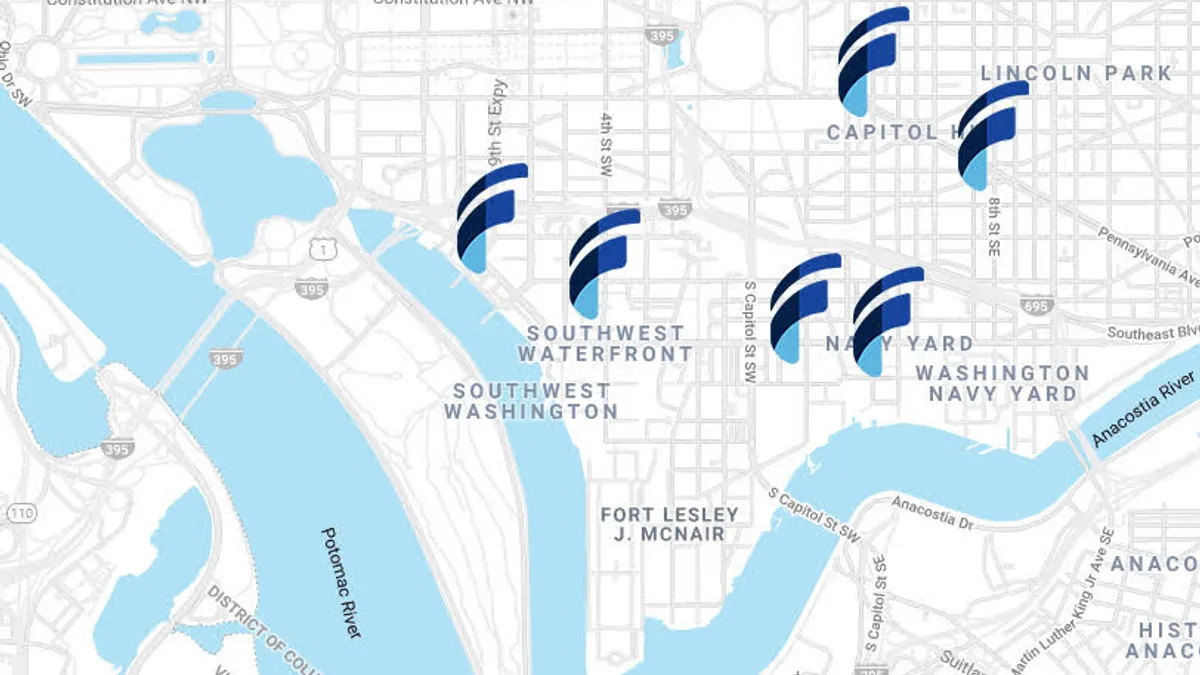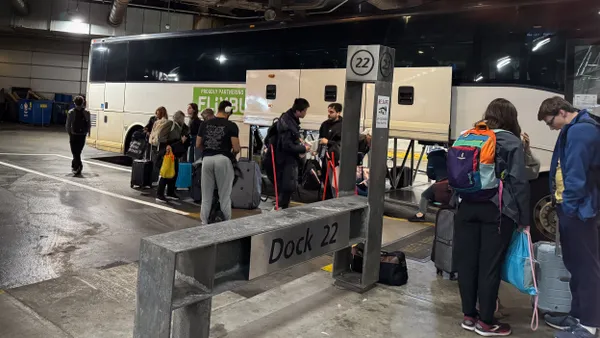Dive Brief:
- Washington, DC's Department of Transportation (DDOT) and digital curb space management company curbFlow have released select results of their three-month pilot to better manage curb space in DC.
- DDOT is still evaluating the full results, but highlights include that double parking went down 64%; commercial drivers made space reservations more than 15,000 times; and over 6,350 drivers from more than 900 companies registered to use the service.
- During the pilot, curb parking was removed at nine locations where commercial deliveries often result in double parking, and drivers could reserve loading zone time online either on-demand or in advance. "We are thinking big about managing all of the activity that's happening on our curbside," DDOT Director Jeff Marootian told Smart Cities Dive. "There is an urgency around safety and congestion, and I am very optimistic about the results we're seeing from this three-month research experiment."
Dive Insight:
The program builds on DC's efforts to improve safety, congestion and convenience through better curbside management. One such initiative includes a recent partnership between DDOT and a local business improvement district that launched the city's first curb space pilot in a popular night life area. Weekday parking spots were transformed into weekend nighttime pick-up/drop-off zones to improve safety and ease traffic jams caused by double-parking.
DDOT found that the curbFlow pilot created immediate safety improvements. "We see, first and foremost, crosswalks and bike lanes are safer. We also see that drivers are able to save time from not having to circle the block multiple times find a space," Marootian said.
The gathered data helps the agency get a better understanding of the overall volume of activity at the curb and what types of activities are occurring. Just from observing the two pilots that have taken place, DDOT believes "everybody wins" with better curb space management, Marootian said.
In addition to the safety benefits, curbFlow was pleased to see the rate of driver uptake with the service. Companies of all sizes — from national delivery providers like UPS to local flower shops — had drivers participate.
CurbFlow CEO and Founder Ali Vahabzadeh told Smart Cities Dive that the company was so focused on providing a solid booking platform and increasing safety that staff didn't consider a third element that surprised them during the pilot: how merchants near the commercial parking zones view the service.
He said merchants "beyond a shadow of a doubt" appreciate the program because it helps achieve more timely delivery pick-ups and drop-offs, from food for restaurants to goods for boutique stores. Delivery insights also helped business owners schedule more efficiently, including shifted hours or overtime for workers that help with deliveries.
Vahabzadeh added that curbFlow has a saying internally that builds off of the old adage, "If you build it, they will come."
"If you make pick-up/drop-off space available to commercial and on-demand operators, who will then train their drivers, those drivers will use it," he said.
DDOT's Marootian agrees that adequate infrastructure is key. But the pilot reiterates the department's thought that infrastructure alone won't solve all the problems, nor will technology alone.
As DDOT continues to analyze the pilot program results, it invites other companies to bring their ideas for pilot programs to the agency. Marootian says DDOT created an "innovation sandbox" to test multiple types of technology.
"We decided to launch an innovation sandbox that would allow for other types of technology to pilot in the District so we can get get a number of different data points to help inform how we dedicate our infrastructure," he said. "We are eager to allow as many companies as possible to conduct research in the District."
CurbFlow is launching its second pilot, in Columbus, OH next week. Like DC, Columbus will run the program at nine locations in downtown and along commercial corridors. But in Columbus, curbFlow will begin automating more of what happens at the curb and offer drivers a native mobile app instead of a mobile website. The app could lead to more advance reservations because the process will be easier, and taxis and ride-hailing services will also be able to use the app along with delivery drivers. Drivers will pay a fee to use the curb space reservation service after a one-month free trial.
CurbFlow will announce partnerships with four more cities in the next few months.












